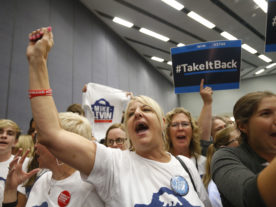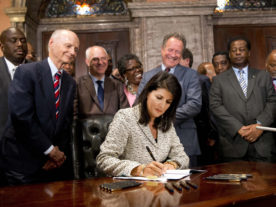Americans are quickly losing faith in Facebook in the wake of numerous controversies surrounding how the company treats personal information and potentially allows the spread of so-called fake news.
As its founder, Mark Zuckerberg, heads to Washington Tuesday to testify before lawmakers, a recent survey by the Digital Citizens Alliance, an Internet safety watchdog, found that almost one in four Americans say “Facebook is not a responsible company because it puts making profits most of the time ahead of trying to do the right thing.”

Facebook CEO Mark Zuckerberg arrives on Capitol Hill in Washington, Monday, April 9, 2018, to meet with Sen. Bill Nelson, D-Fla., the ranking member of the Senate Commerce Committee. Zuckerberg will testify Tuesday before a joint hearing of the Commerce and Judiciary Committees about the use of Facebook data to target American voters in the 2016 election. (AP Photo/J. Scott Applewhite)
Less than one third think Facebook, which boasts 2 billion users worldwide, is a “responsible company because it tries to do the right thing most of the time even if that gets in the way of it making profits.”
Furthermore, Americans, by a 7-to-1 ratio say “Facebook has had a negative influence on political discourse.” Sixty-one percent said ““Facebook has damaged American politics and made it more negative by enabling manipulation and falsehoods that polarize people.”
“Facebook is at a crossroads because of its inability – nearly a year-and- a-half after the election – to get a handle on its divisive effects on society,” said Tom Galvin, Executive Director of Digital Citizens. “From spreading fake and manipulative information to becoming a ‘Dark Web-like’ place for illicit commerce, Facebook seems to losing the trust of the American public. Regulation will not be far behind for social media companies if things don’t change.”
The survey of 925 Americans also found that people by a 2-1 margin (53 percent to 26 percent) say it’s Facebook’s task to remove or warn users about potentially fake news. Almost 60 percent say the company is not doing enough to prevent the spread of false information.

FILE – In this April 4, 2013 file photo, Facebook CEO Mark Zuckerberg walks at the company’s headquarters in Menlo Park, Calif. Facebook has dropped 13.5 percent after allegations a political consulting firm working for the Trump campaign got data inappropriately from millions of Facebook users. On Monday, March 26, 2018, the Federal Trade Commission said it’s investigating the social media giant’s privacy practices and legislators in the U.S. and the U.K. have demanded answers and called for inquiries. (AP Photo/Marcio Jose Sanchez, File)
Facebook’s woes have mounted in recent years with allegations the company allowed political campaigns to access user data. Former executives have also said Facebook has coarsened political discourse in the country and that heavy use of the platform can be harmful to younger people. The company has also allowed murders and suicides to be streamed live on its platform. Lawmakers are expected to explore possible government regulation on the social media behemoth. Zuckerberg has said he’s open to regulation.
Chamath Palihapitiya, a former Facebook executive in charge of user growth, said recently that he doesn’t have a solution to Facebook’s problems.
“My solution is that I just don’t use these tools anymore. I haven’t for years. It has created a huge tension with my friends, huge tensions in my social circle,” he said during a November speech at the Stanford Graduate School of Business.
“The short-term dopamine-driven feedback loops that we have created are destroying how society works: no civil discourse, no cooperation, misinformation, [and] mistruth. And this is not a American problem; this is not about Russian ads; this is a global problem.” he added.
DCA’s survey found 42 percent of Americans think people should have to be 18 to open a Facebook account.
“Digital platforms have to rise to the occasion and assure Internet users that their personal information will be safe, that the content will be legal, safe and not contrived to manipulate. In short, they have to demonstrate they will be the positive influence on our society that they espouse to be,” said Galvin.

























I’ve been waiting a long time, for a title like this. It’s about time, people found out, that being in, or involved in a big company, is not for a “regular” person.
So a survey of 900+ respondents accurately portrays the opinions of 2 billion customers. It may be true, but pardon me for feeling skeptical. It’s a start, VOA News, but you’re not there yet.